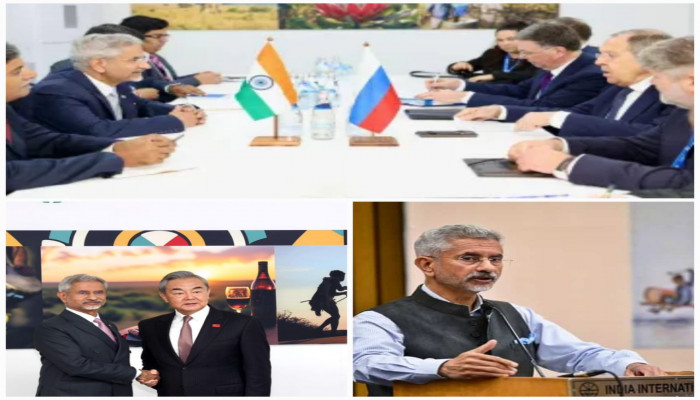‘No room for coercion’: Jaishankar’s veiled dig at China during G20 Ministers’s Meeting
- In Reports
- 10:12 PM, Feb 21, 2025
- Myind Staff
In a veiled critique of China, External Affairs Minister S. Jaishankar said coercion should have no place in international affairs. Advocating for a more inclusive global approach, he asserted that the interests of just a few should not dictate the global agenda.
At the first G20 Foreign Ministers’ Meeting in Johannesburg, Jaishankar highlighted that member nations must acknowledge the severe damage to multilateralism, noting that the UN and its Security Council often remain deadlocked. Speaking ahead of the G20 Summit scheduled for November 22-23 in Johannesburg, he strongly asserted that international law, particularly the 1982 United Nations Convention on the Law of the Sea (UNCLOS), must be upheld.
"Agreements entered into must be observed, and there must be no room for coercion," Jaishankar emphasised.
"Just getting the UNSC back to work is not enough; its working methods and representation must change. More plurilateralism is required to plug global deficits. International cooperation itself must be less opaque or unilateral. And the global agenda cannot be narrowed down to the interests of a few," the external affairs minister S Jaishankar further said.
Jaishankar's comments came shortly after China took part in Pakistan's multinational AMAN-2025 naval exercise, which included Indonesia, Italy, Japan, Malaysia, the US, and observers from 32 other countries. China's involvement in the exercise was in line with its expanding naval presence in the Indian Ocean. Beijing stated that its participation was aimed at anti-piracy efforts, maritime security, and safeguarding key sea routes and overseas interests.
The drill occurred alongside India’s TROPEX exercise, a large-scale naval drill to test combat readiness. India remains cautious of China’s "String of Pearls" strategy, which focuses on establishing military bases and regional alliances.
Last month, reports emerged that China had sent two research vessels to the Indian Ocean, adding to New Delhi’s concerns.
Meanwhile, S. Jaishankar reaffirmed India’s commitment to maritime security, particularly in the Arabian Sea and the Gulf of Aden, where the Indian Navy has played a key role. He also emphasised the importance of restoring regular maritime trade, which geopolitical tensions have disrupted.
"Ensuring maritime security in and around this region is also essential. Indian naval forces have contributed to that in the Arabian Sea and Gulf of Aden. Restoring normal maritime commerce remains a priority," he stated.
At the time of the discussion, the external affairs minister also addressed various global and regional issues, including the conclusion of the Gaza war, the exchange of hostages, and recent developments in the Russia-Ukraine conflict.
"We welcome the Gaza ceasefire and hostage release, support humanitarian assistance, condemn terrorism, and advocate a two-state solution. Maintaining the ceasefire in Lebanon and ensuring an inclusive Syrian-led, Syrian-owned solution is important. Peace and stability in the region are vital for the entire world," S Jaishankar mentioned. "Regarding the Ukraine conflict, we have long advocated dialogue and diplomacy. Today, the world expects that parties concerned deal with each other to end the war," he further mentioned.
US President Donald Trump is advocating for a peace deal with Russia, which could have significant consequences for the ongoing war in Ukraine. However, reports suggest that European leaders and Ukrainian President Volodymyr Zelensky have been excluded from the discussions, sparking concerns about the details of the proposed agreement.
"Geo-politics is a reality, as is national interest. But the very purpose of diplomacy - and a group like G20 - is to find common ground and create the basis for collaboration," Jaishankar emphasised that the best way for member nations to achieve this is by supporting international law, adhering to the UN Charter, and protecting institutions.
"Differences must not become disputes, disputes should not become conflicts, and conflicts should not lead to a bigger breakdown. There are lessons from the last few years for all of us to reflect on. But equally, an experience to draw upon as we seek to lead the world to a better place," Jaishankar ended.







Comments